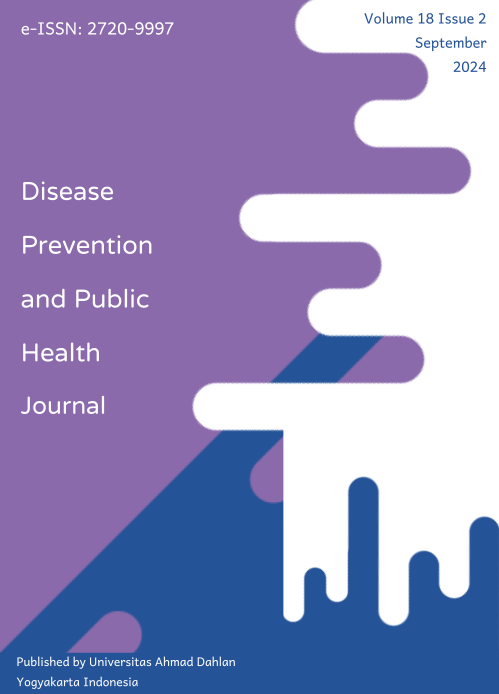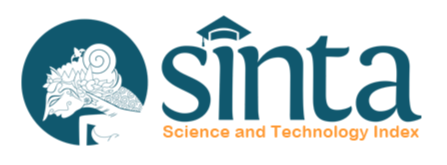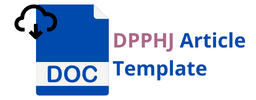HIV Status Disclosure and Associated Factors among Partners and People Living with HIV in the North Central Region of Nigeria
Factors affecting HIV status disclosure
DOI:
https://doi.org/10.12928/dpphj.v18i2.10433Keywords:
HIV, Partner, Disclosure, Rejection, Nigeria, Logistic regressionAbstract
Background: Prevention, treatment, and care for people with HIV/AIDS are important foci of public health and control of the disease. HIV has significantly impacted people's health, income and welfare, as well as socialization. Disclosure of HIV status has proven to increase the opportunities for social support, improved access to necessary medical care, and the opportunity to discuss HIV risk reduction with partner's plan. This study examined factors influencing partner HIV status disclosure among people living with HIV in North Central, Nigeria. Method: This descriptive and cross-sectional study used a multistage sampling technique to randomly select 215 respondents receiving antiretroviral treatment in the study location. Results: The results showed that all youngsters aged 15-19 had never disclosed their HIV status to sexual partners due to the fear of discrimination, rejection, and abandonment. The study found a significant association between minimizing the stress of keeping HIV secret and HIV partner disclosure (β=0.944, Odd Ratio OR=2.570, CI=1.79-3.69, p<0.05). Conclusion: The study showed that discrimination and stigmatization are major sources of discouragement in the disclosure of HIV status to partners as well as the fear of rejection and abandonment especially among young adolescents. It is therefore recommended that HIV treatment and awareness programs should incorporate HIV status disclosure and counselling as part of intervention projects for HIV/AIDS programs. HIV status disclosure to partners will foster and promote partner’s understanding, patient's health and well-being. This will not only bring social and psychological support, but also reduce misguidance on HIV status.
References
M. Sundholm, “UNAIDS: Joint United Nations Programme on HIV/AIDS,” Office of the Secretary-General’s Envoy on Youth. Accessed: Jun. 02, 2024. [Online]. Available: https://www.un.org/youthenvoy/2013/08/unaids-joint-united-nations-programme-on-hivaids/
A. A. Awofala and O. E. Ogundele, “HIV epidemiology in Nigeria,” Saudi J Biol Sci, vol. 25, no. 4, pp. 697–703, 2018, doi: 10.1016/j.sjbs.2016.03.006.
G. O. Udigwe, I. I. Mbachu, V. Oguaka, O. A. Onyegbule, O. Udegbunam, and O. S. Umeononihu, “Pattern and predictors of partner disclosure of HIV status among HIV positive pregnant women in Nnewi Nigeria,” Niger J Med, vol. 22, no. 4, pp. 336–340, 2013.
M. Plotkin et al., “Outcomes and Experiences of Men and Women with Partner Notification for HIV Testing in Tanzania: Results from a Mixed Method Study,” AIDS Behav, vol. 22, no. 1, pp. 102–116, 2018, doi: 10.1007/s10461-017-1936-x.
WHO, “HIV Status Disclosure to Sexual Partners: Rates, Barriers and Outcomes for Women.” 2004. Accessed: Feb. 17, 2020. Online. Available: http://www.who.int/gender/en
WHO, “Guidelines On Hiv Self-Testing And Partner Notification: Supplement To Consolidated Guidelines On Hiv Testing Services.” Geneva:Switzerland: World Health Organization Press., 2016.
A. E. Arrey, J. Bilsen, P. Lacor, and R. Deschepper, “‘It’s My Secret’: Fear of Disclosure among Sub-Saharan African Migrant Women Living with HIV/AIDS in Belgium,” PLoS One, vol. 10, no. 3, p. e0119653, 2015, doi: 10.1371/journal.pone.0119653.
D. Dahourou, J.-P. Raynaud, and V. Leroy, “The challenges of timely and safe HIV disclosure among perinatally HIV-infected adolescents in sub-Saharan Africa,” Curr Opin HIV AIDS, vol. 13, no. 3, pp. 220–229, 2018, doi: 10.1097/COH.0000000000000462.
S. E. Stutterheim et al., “HIV status disclosure among HIV-positive African and Afro-Caribbean people in the Netherlands,” AIDS Care, vol. 23, no. 2, pp. 195–205, 2011, doi: 10.1080/09540121.2010.498873.
WHO, “HIV Status Disclosure to Sexual Partners: Rates, Barriers and Outcomes for Women.” 2004. Accessed: Feb. 17, 2020. Online. Available: http://www.who.int/gender/en
K. K. Kadiri, M. K. Ahmad, and C. S. Mustaffa, “HIV/AIDS and Cultural Practices in Nigeria: An Implication for HIV/AIDS Preventive Communication Campaign,” New Media and Mass Communication, vol. 27, no. 0, p. 19, 2014, doi: 10.7176/NMMC.vol2719-30.
M. A. Bulterys et al., “Correlates of HIV status non-disclosure by pregnant women living with HIV to their male partners in Uganda: a cross-sectional study,” J Acquir Immune Defic Syndr, vol. 86, no. 4, pp. 389–395, 2021, doi: 10.1097/QAI.0000000000002566.
F. Masiye and R. Ssekubugu, “Routine third party disclosure of HIV results to identifiable sexual partners in Sub-Saharan Africa,” Theor Med Bioeth, vol. 29, no. 5, pp. 341–348, 2008, doi: 10.1007/s11017-008-9085-x.
A. Odiachi et al., “HIV status disclosure to male partners among rural Nigerian women along the prevention of mother-to-child transmission of HIV cascade: a mixed methods study,” Reprod Health, vol. 15, no. 1, p. 36, 2018, doi: 10.1186/s12978-018-0474-y.
A. Ismaila, T. Mohammed, J. Kehinde, M. Hindatu, and M. Maryam, “Perception and predictors of HIV status disclosure among people living with HIV/AIDS in Sokoto, Nigeria,” International Archives of Medicine and Medical Sciences, vol. 1, no. 3, pp. 2705–1412, 2019, doi: https://doi.org/10.33515/iamms/2019.030/30.
C. Mutambo and K. Hlongwana, “Healthcare Workers’ Perspectives on the Barriers to Providing HIV Services to Children in Sub-Saharan Africa,” AIDS Res Treat, vol. 2019, p. 8056382, 2019, doi: 10.1155/2019/8056382.
F. Oluwasina, “Factors Influencing Adherence to Antiretroviral Drugs among HIV Positive Young Women and Adolescent Patients in North Central Nigeria,” TIJPH, pp. 144–153, 2019, doi: 10.21522/TIJPH.2013.SE.19.01.Art015.
A. Bhattacherjee, “Social Science Research: Principles, Methods, and Practices,” Textbooks Collection, 2012, Online. Available: https://digitalcommons.usf.edu/oa_textbooks/3
S. O. Gbadamosi et al., “Targeted HIV testing for male partners of HIV-positive pregnant women in a high prevalence setting in Nigeria,” PLOS ONE, vol. 14, no. 1, p. e0211022, 2019, doi: 10.1371/journal.pone.0211022.
O. E. Oseni, I. P. Okafor, and A. O. Sekoni, “Issues Surrounding HIV Status Disclosure: Experiences of Seropositive Women in Lagos, Nigeria,” Int J Prev Med, vol. 8, p. 60, 2017, doi: 10.4103/ijpvm.IJPVM_136_15.
M. H. Bornstein, J. Jager, and D. L. Putnick, “Sampling in Developmental Science: Situations, Shortcomings, Solutions, and Standards,” Dev Rev, vol. 33, no. 4, pp. 357–370, 2013, doi: 10.1016/j.dr.2013.08.003.
J. J. Toromo et al., “‘I have never talked to anyone to free my mind’ – challenges surrounding status disclosure to adolescents contribute to their disengagement from HIV care: a qualitative study in western Kenya,” BMC Public Health, vol. 22, no. 1, p. 1122, 2022, doi: 10.1186/s12889-022-13519-9.
S. K. Singh, N. Sharma, and S. K. Sharma, “Dealing with Dilemmas: Understanding the Process and Challenges of Disclosing the HIV Status of People Living with HIV/AIDS Through Gender Lens,” Journal of Health Management, vol. 23, no. 3, pp. 380–400, 2021, doi: 10.1177/09720634211035227.
D. Hallberg, T. D. Kimario, C. Mtuya, M. Msuya, and G. Björling, “Factors affecting HIV disclosure among partners in Morongo, Tanzania,” International Journal of Africa Nursing Sciences, vol. 10, pp. 49–54, 2019, doi: 10.1016/j.ijans.2019.01.006.
M. D. Stein et al., “Sexual Ethics: Disclosure of HIV-Positive Status to Partners,” Archives of Internal Medicine, vol. 158, no. 3, pp. 253–257, 1998, doi: 10.1001/archinte.158.3.253.
M. Evangeli and A. L. Wroe, “HIV Disclosure Anxiety: A Systematic Review and Theoretical Synthesis,” AIDS Behav, vol. 21, no. 1, pp. 1–11, 2017, doi: 10.1007/s10461-016-1453-3.
C. M. Obermeyer, P. Baijal, and E. Pegurri, “Facilitating HIV Disclosure Across Diverse Settings: A Review,” Am J Public Health, vol. 101, no. 6, pp. 1011–1023, 2011, doi: 10.2105/AJPH.2010.300102.
Downloads
Published
Issue
Section
License
Copyright (c) 2024 Universitas Ahmad Dahlan

This work is licensed under a Creative Commons Attribution-ShareAlike 4.0 International License.
Authors transfer the copyright and grant the Disease Prevention and Public Health Journal right of first publication with the work simultaneously licensed under a Creative Commons Attribution License (CC BY-SA 4.0) that allows others to share (copy and redistribute the material in any medium or format) and adapt (remix, transform, and build upon the material) the work for any purpose, even commercially with an acknowledgement of the work's authorship and initial publication in Disease Prevention and Public Health Journal. Authors are able to enter into separate, additional contractual arrangements for the non-exclusive distribution of the journal's published version of the work (e.g., post it to an institutional repository or publish it in a book), with an acknowledgement of its initial publication in Disease Prevention and Public Health Journal. Authors are permitted and encouraged to post their work online (e.g., in institutional repositories or on their website) prior to and during the submission process, as it can lead to productive exchanges, as well as earlier and greater citation of published work (See The Effect of Open Access).

This work is licensed under a Creative Commons Attribution-ShareAlike 4.0 International License.







